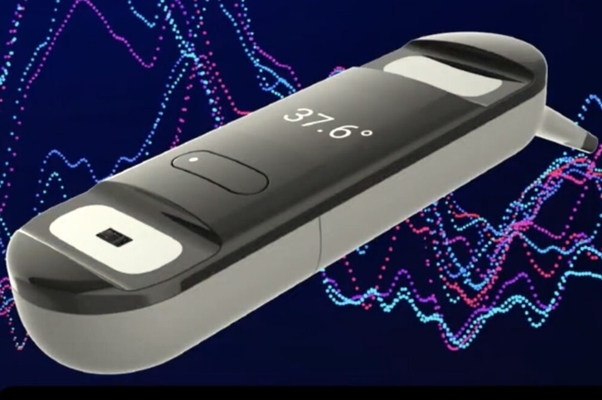OmnySense is upgrading the simple thermometer found in nearly every home to track vital health parameters with ease.
By Abigail klein Leichman, Israel21c
Almost every household has a thermometer in the medicine cabinet. Pop it under your tongue to check your temperature – couldn’t be easier.
The Israeli company OmnySense is upgrading the basic thermometer into a remote health-tracking device.
It reliably measures not only body temperature but also respiratory rate, pulse rate, ECG and blood oxygen.
“Everybody knows how to use a thermometer,” says OmnySense CTO Ian Solomon.
“There are all sorts of health-tracking solutions for niche markets like diabetics but we’re doing it for general needs. And the major criterion to make this work is usability,” he says.
“Older people have difficulty using technological medical devices. So just as other products in the home have been upgraded, like the percolator to the coffeemaker, we made an integrated system as an upgrade to the thermometer.”
Designed by Tamooz Product Design in Kfar Saba, the patented OmnySense device incorporates a microphone that listens to breath sounds. A pulse oximeter and electrocardiograph (ECG) electrodes reside in the grooves where fingers hold the device.
Via a free app, the respiratory and ECG data is sent to the cloud for further analysis.
“An algorithm analyzes and graphs the cardiac data from the ECG and does the same for any respiratory crackles and wheezes picked up by the microphone,” says Solomon.
“Patients at home can have their health tracked on an ongoing basis. If they want to have a telemedicine session, then all the data, trends and analysis are available to the remote physician before the call. The physician can easily see if the person is getting better or worse over time.”
Simpler than a Stethoscope
The physical device differentiates OmnySense from contact-free Israeli telemedicine technologies such as Binah.ai and Donisi Health. The tracking aspect differentiates OmnySense from Israel’s TytoCare handheld remote exam kit.
“Tyto is great for parents and school nurses,” says Solomon. “But we are focused on adults and the elderly. The Western population is getting older, while the number of physicians and nurses is staying roughly the same, so telehealth is increasingly important in providing data.”
“The beauty of our device is that you can use it yourself, unlike a stethoscope that you can’t place on your own lower back to hear the lung sounds,” he stresses.
Solomon explains that the OmnySense microphone is simpler than using a stethoscope.
“When your mouth is closed around the thermometer, you’ve got a ‘sound box’ running from your nose to the bottom of your lungs, and the microphone can hear basically everything from within,” he says.
Dr. Doron Menachemi, director of the Brunner Institute for Cardiovascular Research at Wolfson Medical Center in Holon, is leading a clinical trial of the device through the end of 2022.
The trial is comparing the respiratory sounds as detected by the OmnySense device to those same sounds as detected with a standard stethoscope from 10 locations on the chest and back of participants.
“If successful, this will constitute a major step towards enabling remote analysis of the respiratory condition of patients at home, where the patient just uses a simple thermometer-shaped device,” said Menachemi.
Menachemi also is interested in determining whether the OmnySense device can assist with diagnosis by differentiating the sounds of one lung condition from another.
FDA Approval Expected
OmnySense was founded in Tel Aviv in May 2019 by three serial entrepreneurs: Ian Solomon, Yossi Aldar and Amir Elhasid.
Solomon and Aldar were behind SteadyMed Therapeutics, which developed the PatchPump wearable injector platform, and was acquired by United Therapeutics in 2018.
Solomon, Aldar and Elhasid (formerly of Teva Respiratory) collaborated on RespiDx, a humanitarian venture that aimed to use a special pacifier to diagnose pneumonia in children in the developing world. That project was stymied by changing priorities of the grant agencies in that field.
At first, investors were skeptical of OmnySense as well. “Once Covid came along, they saw its value,” says Solomon.
The company raised $1.5 million in seed funding from angel investors and recently signed its first strategic investor, medical supply maker Texas Medical Technology.
“Texas is interested in using OmnySense to track patients post-discharge, as the hospital bears much of the cost of those patients who return within 30 days,” says Solomon.
“We are still looking to identify large commercial partners for whom we can provide our data on a subscription basis, whether health providers or people looking after the elderly at home, to track the patient’s health data over the course of weeks or months.”
Another promising business model is the large U.S. pharmacy chains in America that are setting up in-store, one-stop primary care clinics staffed by nurse practitioners. The device could be available in the clinics or on the shelves of the store.
Solomon says OmnySense expects U.S. Food and Drug Administration approval in about a year.
“We submitted utility patents and 11 design patents covering our device every which way, because when this hits the market everyone will want to copy it,” Solomon predicts.
Do You Love Israel? Make a Donation - Show Your Support!
Donate to vital charities that help protect Israeli citizens and inspire millions around the world to support Israel too!
Now more than ever, Israel needs your help to fight and win the war -- including on the battlefield of public opinion.
Antisemitism, anti-Israel bias and boycotts are out of control. Israel's enemies are inciting terror and violence against innocent Israelis and Jews around the world. Help us fight back!



